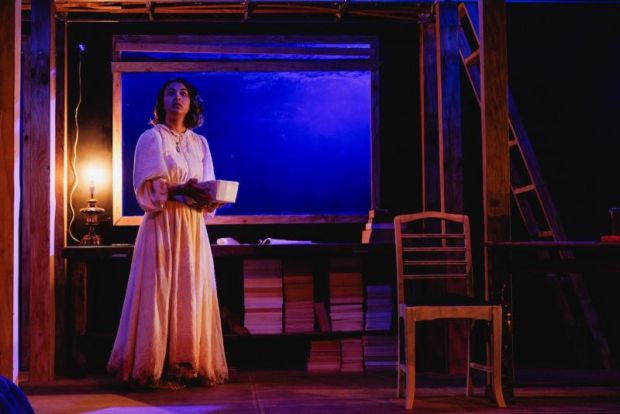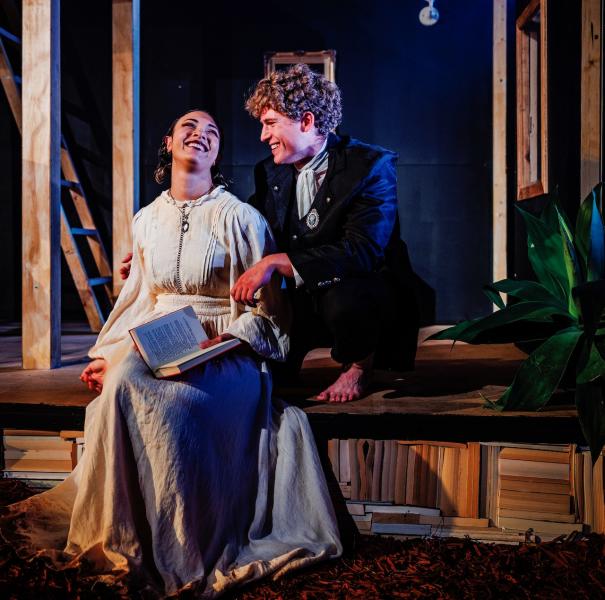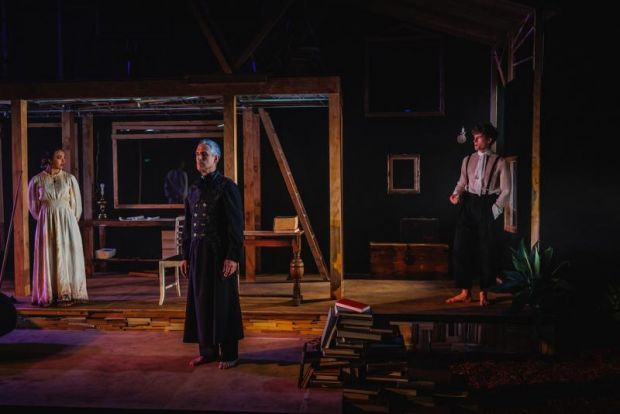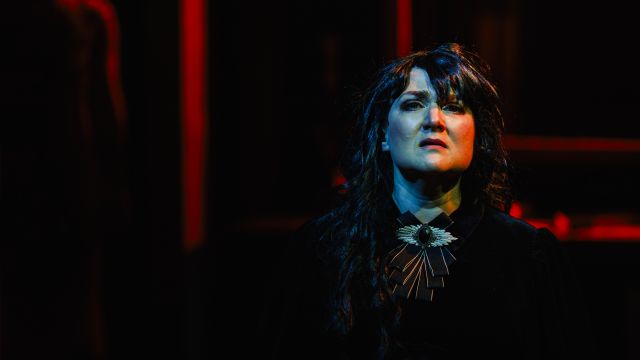Ghosts
Jodi Gallagher’s adaptation of Ibsen’s 1881 play retains the late 19th century setting but relocates the drama to the heat and dust of the Australian bush. This might feel at first arbitrary, but as a metaphor and for the inclusion of different ‘ghosts’, it works well. Ibsen’s plot meanwhile remains much the same. Wealthy widow Mrs Alving (an authoritative performance from Laura Iris Hill) welcomes home her flaky artist only son Oswald (Gabriel Cali) from Paris - just as an orphanage she has financed is completed. The on-the-make carpenter builder is Jacob Engstrand (Oliver Cowen). He claims to be the father of Mrs Alving’s ward and housemaid Regina (Kira May Samu). Meanwhile, Mrs Alving’s advisor and business manager - and antagonist – is Pastor Manders (Philip Hayden).
Was it ever tempting or even considered, I wonder, to drag the story into the present? But the 19th century setting makes Manders’ power and influence plausible (as does Hayden’s performance), along with Oswald’s ‘illness’, the other characters’ relationships and backstory. Clearly, choices here are the result of a close collaboration between Gallagher and director Steven Mitchell Wright – who is also the designer.

We might ask why adapt Ghosts at all? Of course, this version of the play must stand on its own merits, and there’s not a lot to be gained by comparisons – Ibsen did this, Gallagher does that – but what does matter is the chosen theatrical style and mode of this production – that is, how effectively do the changes to character and emphasis tell the story – and do those changes make the story relevant for contemporary audiences?
Ibsen was for the most part an exponent of ‘naturalism’. He wrote of Ghosts specifically, ‘My object was to make the reader [and presumably the spectator] feel that he [sic] was going through a piece of real experience.’ On the other hand, Mitchell Wright says, in an interview, that he and Ibsen are ‘diametrically opposed in regard to [their] theatrical priorities.’ That is clearly demonstrated here.
Mitchell Wright has given us some very powerful and original theatre. His Medea at Theatre Works was in no way ‘naturalistic’, but it was visceral in its impact. But Medea is a mythical tragedy of larger-than-life archetypical characters, already heightened and stylised - even operatic if you like.

That style, so effective with Medea, feels to me imposed on the intimacy and hidden secrets of Ghosts. This tale of judgemental religion, conventional ‘morality’, lies, hypocrisy, familial bonds, sexual repression and sexual excess, rape, grubby financial deals, and, centrally, the tragedy of the sins of the fathers being visited upon the children is not at all trivial but it is in fact, however heartbreaking, ordinary, everyday, suffered by human all too human individuals.
But the acting style often becomes declamatory, or proclamatory, in dialogue but especially in the characters’ monologues – which are largely exposition or revelations of inner states. Then there are strange and indeed distracting directorial choices such as the ritualistic dance with Leahannah Ceff’s portentous music that begins and ends the play. Regina’s costume changes for no discernible reasons, or Oswald climbing onto the two-storey set’s roof so that we fear for the actor’s safety. The strange appearances of characters gesticulating or praying outside windows or conducting unheard business in the garden.
Yes, some elements are clearer and stronger – but only per se. Mrs Alving’s extensive reading of ‘modern’ or ‘nihilist’ books – so strongly opposed by Manders – gives Gallagher the opportunity to introduce Nietzsche’s theory of ‘Eternal Recurrence’ – an entirely apt and gloomy addition to the central theme of ‘ghosts’ that influence, constrict and define us. Laura Iris Hill succeeds in making this a dismaying and moving moment. We feel her dread that she might live her entire nightmare over again – and again. Yet another book enables her to read to us the horrible reality of tertiary syphilis.

But overall the chosen style, this rhetorical mode, curiously keeps us out – at a distance as it were. We feel that Mitchell Wright, such a bold and individual director, here pursues a concept, and adds touches and flourishes that don’t illuminate the story he and Gallagher want to tell us.
Michael Brindley
Photographer: Daniel Rabin
Subscribe to our E-Newsletter, buy our latest print edition or find a Performing Arts book at Book Nook.

